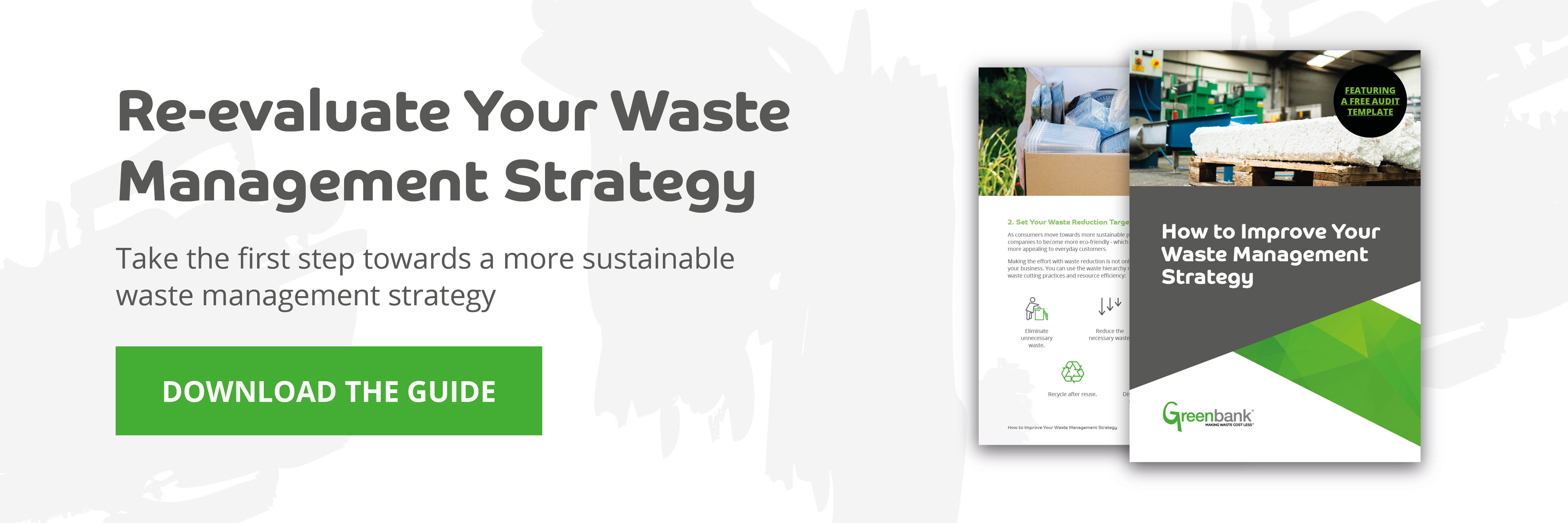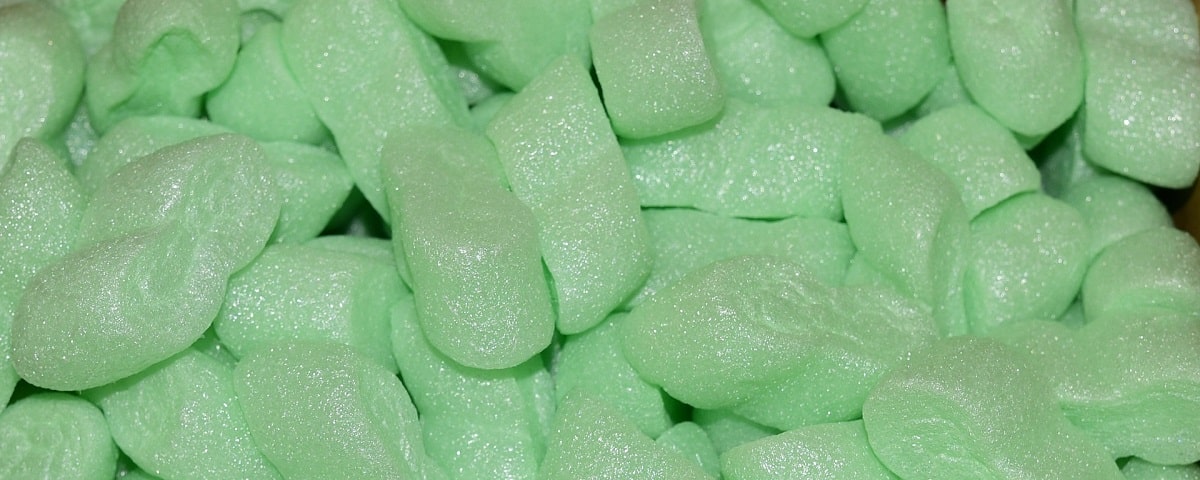Recycling is a hot topic and will continue to be so. We often hear about household recycling and the waste materials you can and can’t pop in the relevant bin. What’s it like for a business?
What’s your current recycling process and are you making the most out of it? Could it be enhanced to save both time and money?
We see a lot of businesses unsure about their surplus of waste polystyrene being produced. Many people assume it’s unrecyclable, meaning more often than not it ends up going straight to landfill – costing money in terms of collection and Landfill Tax. However, that’s not always the case.
In this blog, we’ll be showing you that polystyrene is recyclable, alongside the direct benefits that come from doing so.
- What Exactly is Polystyrene?
- What Are The Benefits of Recycling Polystyrene?
- Which Industries Use Polystyrene?
- The Issues With Polystyrene Disposal
- How Can You Recycle Polystyrene Effectively?
What Exactly is Polystyrene?
Available in solid blocks or foam, polystyrene is a synthetic aromatic hydrocarbon made from the monomer styrene. It’s a clear, hard, brittle, lightweight material, often used in packaging. Polystyrene is an inexpensive material and is therefore widely used, particularly among factories manufacturing companies and the food industry.
Let’s take a closer look at some of the specific industries and products that make use of polystyrene. If you resonate with any of these we will tell you later on in this post, how you can successfully recycle the material whilst making a profit.
So what are the advantages of recycling polystyrene?
What Are The Benefits of Recycling Polystyrene?
When you recycle polystyrene through the use of a polystyrene compactor, there a number of key benefits produced:
Waste Reduction
Probably the most obvious solution. By carefully recycling polystyrene, the amount going to landfill and ending up in the sea is reduced; as long as this is done properly.
Volume Reduction
Not only can some polystyrene compactors compact up to 220kg of polystyrene every hour, but the material is also reduced in size by around 95% every time.
Carbon Footprint
The origins of polystyrene are in petroleum. Recycling not only reduces carbon footprint by extending the material’s lifecycle, it also puts less pressure on the limited resources available.
Space Saving
Because polystyrene is reduced to around 5% of its original capacity, it takes up minimal space on site, which also potentially reduces trip or fall hazards in the workplace.
Additional Revenue Stream
Because there’s a market ready and waiting for polystyrene blocks, this makes the perfect additional revenue stream for a business. You can read more about making money from your used polystyrene here.
Which Industries Use Polystyrene?
Countless businesses utilise polystyrene across the world, but these industries are where you’ll find it used the most often.
White Goods
Polystyrene doesn’t react with other materials making it ideal for the packaging and transportation of fridges, air conditioners, ovens, microwaves, hoovers, blenders and more.
Construction
While building contractors usually don’t create enough continuous throughput to warrant disposal using a machine, more often than not they will begin their work with a one-off load of polystyrene. Bigger construction projects may benefit from a detailed waste disposal method for polystyrene.
Electronics
Computers, televisions and IT equipment are required to look fantastic when unboxed. They need to be unscathed and look just as good as they did on the shelf. Polystyrene is the best solution for protecting these precious electronic items.
Food Industry
Polystyrene is perfect for keeping food fresh for longer periods of time. It also makes great insulation and is a cheap option to many of the available alternatives.
Medical Industry
Polystyrene is easy to sterilise making it a good choice for medical applications. Tissue culture trays, test tubes, Petri dishes, test kits and medical devices are all transported with the material.
While an incredibly useful product, polystyrene also causes issues, issues that occur upon its disposal.
So what are the advantages of doing it this way?
The Issues With Polystyrene Disposal
Because not many businesses know that polystyrene is actually a recyclable and reusable product, it usually ends up disposed of in the most conventional way – being sent to landfill.
However, in some circumstances, polystyrene can be a great detriment to other environments. Here’s how:
Landfill
Unfortunately, much of this material ends up in landfills, remaining there for hundreds of years as it breaks down. This means the full value of polystyrene isn’t being used within its lifecycle. According to the Department for Environment, Food & Rural Affairs’ (DEFRA) ‘UK Statistics on Waste Report’, in 2018, around 14.6 million tonnes of waste was sent to landfill – a huge amount.
Marine Life
As polystyrene breaks down, it creates micro-particles of waste which can easily end up in streams, rivers and other aquatic environments, eventually making its way to the seas.
When it breaks down, it can appear edible to aquatic organisms such as fish. When ingested, it clogs digestive systems before killing a large proportion of marine life. Unfortunately, polystyrene comprises up to 90% of all marine debris.
Air Quality
When burned, polystyrene releases styrene into the air. Styrene is believed to be a cancer-causing carcinogen.
While reports and campaigns focus on the issues of plastic pollution, investigations into the impacts of polystyrene are few and far between. However, when recycled, the issues with polystyrene disposal are circumnavigated, providing a longer life to the material, limiting its impact.
So how is it actually recycled?
How Can You Recycle Polystyrene Effectively?
First of all, you need to determine how much polystyrene your company uses on a daily, weekly and monthly basis. From here you can begin investigating polystyrene compactors.
These machines come with an abundance of benefits. By loading the waste material directly into the compactor, a large press force is applied in order to reduce the size of polystyrene. From here, bales are created in varying sizes, depending upon the machine model.
Compactors are very straightforward to operate, are low maintenance and can deal with both wet and dry polystyrene. Once you have enough bales these can be collected and paid for by a recycling company of your choice. Not only will you be reducing the carbon footprint of your company, you’ll be capitalising on that additional revenue stream we mentioned earlier.
Reduce waste being sent to landfill and the costs attached to this. Review existing policies on carbon footprint and investigate polystyrene compactors. If you’re interested in exploring the types of compactors that are available to you, download our recycling compactor brochure by clicking on the link below.

Recommended Machinery:




